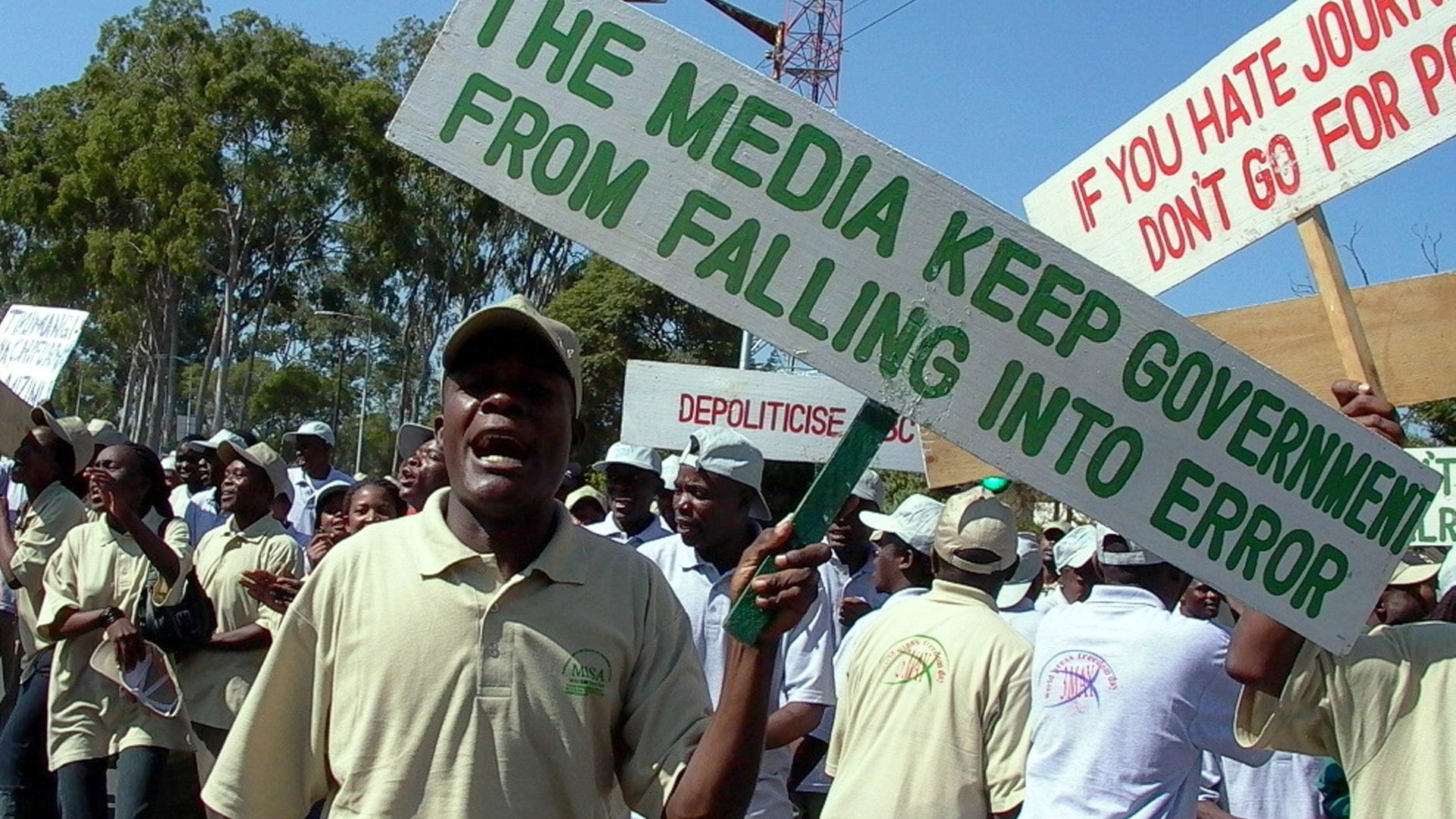African journalists have tips for their US counterparts on dealing with a president that hates the press
Last week, Washington Post Executive Editor Marty Baron voiced great apprehension about press freedom in the US under a Donald Trump presidency. “Many journalists wonder with considerable weariness what it is going to be like for us during the next four [years],” Baron said in a stirring speech. “Will we be incessantly harassed and vilified? Will the new administration seize on opportunities to try intimidating us? Will we face obstruction at every turn?”


Last week, Washington Post Executive Editor Marty Baron voiced great apprehension about press freedom in the US under a Donald Trump presidency. “Many journalists wonder with considerable weariness what it is going to be like for us during the next four [years],” Baron said in a stirring speech. “Will we be incessantly harassed and vilified? Will the new administration seize on opportunities to try intimidating us? Will we face obstruction at every turn?”
As America enters the era of a thin-skinned president known for lashing out at press coverage that does not meet his approval, it might be helpful for US news media to draw from the experiences of journalists operating in hostile environments. Many of such environments are in Africa, particularly those countries with long-serving presidents who have been in power for decades.
Ugandan journalist Angelo Izama, a former Knight Fellow at Stanford University, commented with sarcasm on the peculiar situation of US journalists. “I was joking with Charles Onyango Obbo [another Ugandan journalist] about being consultants to American journalists who may now face similar challenges with the advent of the African leader Donald Trump.” Izama was probably riffing off Trevor Noah’s comic but profound observation that Donald Trump is just like an African president.
One has to only consider the fact that the only other world leader with a habit of snapping at journalists and other critics with angry tweets is Rwanda’s Paul Kagame. The direct comparison between Trump and Kagame probably stops there, but one could also find similarities—in terms of vilification of the press—between Trump and The Gambia’s outgoing Yahya Jammeh or Uganda’s Yoweri Museveni.
“From the outside looking in, I am kind of feeling bad for journalists under a Trump administration,” said Liberian editor Rodney Sieh, who has worked in several US newspapers including the Kansas City Star and The Post Standard in Syracuse, NY. “It is clear to see that American journalists are in for a very tough roller coaster ride.”
Sieh, Izama and other journalists from the around the continent carry many bruises from political intimidation. “Initially, for me, it was shocking,” said Kenyan investigative journalist John-Allan Namu. “The experience showed me just how thin the line is between objective critique of the state with regard to security and being called unpatriotic, a terrorist sympathizer or, very plainly, a terrorist.”
The effect of such pressure can be demoralizing. “It took a lot of self-convincing to keep on reporting,” he said. “It does make you doubt yourself,” according to Sieh. “It is the only way they think they can break you and it can be psychologically draining at times and takes a toll on you as a journalist and make you doubt who or what you are.”
Award-winning Angolan investigative journalist Rafael Marques de Morais described the emotional battering. “Psychologically, they make you feel first like you are out of line, then out of touch, then being a nuisance,” he said. “For women, they use the weapon of denigration on the basis of sex”, said award-winning editor Solange Lusiku of the Congolese newspaper Le Souverain. The result can be social ostracism. “My life has been about attending functions and national events and finding myself among people who would rather not speak to me,” said editor Bheki Makhubu of Swaziland’s The Nation.
Intimidation does not stop there. “They start going after you with threats, surrounding you, engaging in backroom deals with your boss to make you feel you are the one out of sync. Then, the lawsuits, the bruisings, the exclusion from official coverage, from official sites,” according to Marques, speaking from experience. “There are the pressures on your loved ones, which are unbearable,” added Burkinabe journalist Ahmed Newton Barry. “We very quickly realize that our work and life are inseparable,” said award-winning Burundian editor Bob Rugurika.
For Izama, the real goal of political intimidation of one journalist, or one news organization is to silence others in toeing the line. “Perhaps […] Mr. Trump know this well. If you focus the laser on one person, one organization, it has a great impact on the rest. It isolates and amplifies fear.” Intimidation can also lead to self-censorship, according to Ndebele, but it doesn’t have to be that way.
For Izama, pressure can bring focus. “Not all fear is bad. The sense of urgency of fear, its psychological pressure has the effect of clarifying why journalism matters,” he said, adding: “Because if it were not so important it would not attract the threats it does.” In fact, conviction is really important. “What drives you is the need to tell the story,” said Zimbabwean journalist Zenzele Ndebele. “There are times when you just don’t care what will happen to you when you have written the story as long the story is worth to be told.” Marques put it best: “this is a fight and one shall not have the pretense of neutrality,” he said. “In the end it is a fight for one to live quietly in your own country without having to turn a blind eye.”